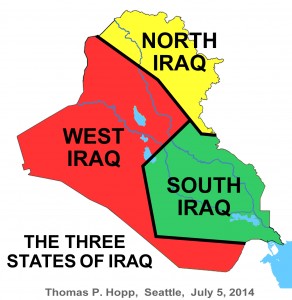 In a previous post, I suggested that Iraq could end its years of bloody conflict by creating a U.S.-style Senate. As the hypothetical map shows, division of Iraq into three “states” similar to those in the U.S. would create a new institution that gives voice to the concerns of the three main ethnic and religious divisions of the country.
In a previous post, I suggested that Iraq could end its years of bloody conflict by creating a U.S.-style Senate. As the hypothetical map shows, division of Iraq into three “states” similar to those in the U.S. would create a new institution that gives voice to the concerns of the three main ethnic and religious divisions of the country.
As the horrors of the ISIL occupation have shown, life in Iraq without a Senate has led to deep divisions, power vacuums, and easy insurgent conquests of disenfranchised regions. So, how would a Senate (as part of a U.S.-style bicameral legislature) help to solve the problem?
That’s easy. You see, even though majority rule is the mainstay of democracy and a very desirable goal for any country, there are other needs of a population that may not be solved by simple majority rule. The example here is obvious. How can Sunni Arabs or Kurdish citizens of Iraq hope to have their concerns heard in the halls of government? One answer that DOES NOT WORK is simple majority rule. And that’s how Iraq is operating now. No wonder Sunnis and Kurds have grave doubts about their futures. And no wonder ISIL still has much support in the regions it has overrun.
The dissatisfaction that allowed ISIL to stage its takeover in the north and west of Iraq will remain, even as ISIL itself is coming to be seen as too extreme a solution for the tastes of the local populations. Nevertheless, the rising tide of Shiite armies from the south will in no way calm the nerves of Sunnis and Kurds who have been oppressed by the Shiite dominated government for years now.
President Obama has called for a “more inclusive” government in Iraq. But he hasn’t spelled out how that can come to be. Hence my effort here. Let me say it again. IRAQ NEEDS A SENATE.
Right now, democratic voting by the people of Iraq always leads to a Shiite dominated Council of Representatives, equivalent to the simple majority politics of the U.S. House of Representatives. And that’s it. There is no legislative body that looks beyond a simple majority vote. And that’s bad. The very essence of Iraq’s current government organization dictates that the majority Shiite population will always get its way on everything. So what else might Iraqis do?
It the map above were used to collect votes from the populations of three U.S.-style “states”, then Shiites would always win in the predominately Shiite region of South Iraq, Sunni Arabs would always win in the predominately Sunni Arab West, and Kurdish candidates would always win in the predominately Kurdish North. How does that help?
In the U.S.’s bicameral legislature, no law can be passed without BOTH legislative bodies approving it. If Iraq had such a system—which it currently does not—then certain problems could be alleviated. Nicest of all, a balance of power between the rival factions could be created. And that balance ought to go a tremendous way toward calming the fears and outrage of those who feel they have no voice in Iraq’s government today. How?
As happens in the U.S., the two houses would broker national power in ways very different from today’s Iraq, and a balance of interests could be struck. For instance if Shiites were to propose Senate legislation that was hated by both Kurds and Sunni Arabs, then their motion would be defeated by Senators from the North and West (as I proposed before, the three states would send an equal number of Senators to the Senate–seven from each “state” in the model I proposed).
One might ask why the Shiites who now rule absolutely through a simple majority in the Council of Representatives, would ever allow the creation of a Senate that could override their will? Well, bear this in mind: the Council of Representatives, in turn, could block any Sunni-Kurd legislation coming from the Senate that it didn’t like.
This may sound like a recipe for stalemate, but will that be the case? Maybe not. Because the two legislative houses would now protect the interests of all three groups, it should be possible to go forward in a spirit of national compromise, enacting legislation that takes everyone’s concerns into consideration. In such an atmosphere of cooperation backed by the ability to block any really repugnant proposals, a new national unity could be forged and a brighter future for all Iraqis could be created.
Still not convinced? Then consider the ISIL insurrection, realize it stems from lack of representation of minorities, and get ready for it to repeat again and again and again and again. Iraq’s 2005 constitution actually calls for a Senate (termed a Council of Union or Federation Council) but no such body has yet been created.
I believe that, deep down, Northern and Western Iraqis want to be part of a stable and fair nation. A Senate would open the door to that possibility and bring all Iraqis lasting peace and prosperity.







